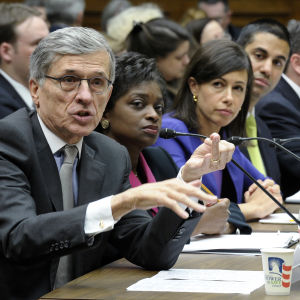One of the Federal Communications Commission’s three Democratic commissioners broke ranks from the majority Tuesday to side with its two Republican commissioners on possibly the hottest issue pending before the agency — set-top boxes.
During a congressional oversight hearing Tuesday FCC Commissioner Jessica Rosenworcel agreed there are flaws in Chairman Tom Wheeler’s proposal to mandate pay-TV providers make their content available on third-party set-top boxes.
“I’ll make it easy — yes,” Rosenworcel said in response to a yes or no question from Tennessee Republican Rep. Marsha Blackburn about whether the commissioners thought the initial proposal was flawed.
Though such bipartisan consensus has become increasingly rare at the FCC, Rosenworcel wasn’t the only Democrat to imply there are flaws with the pitch. Commissioner Mignon Clyburn declined to answer the question, while Wheeler said “everything is designed to seek improvement.”
“That’s what we’re trying to do right now,” Wheeler said when asked about taking a different approach from the original Notice of Proposed Rulemaking. “We’re working with the industry.”
All four fellow commissioners agreed on the need for another approach, and that the one recently pitched by Comcast, DirecTV, and the National Cable and Telecommunications Association to offer their content on apps shows promise.
“One page. It’s not a proposal, it’s a press release,” Wheeler said. “The great thing is that it lowered the temperature and we can talk together.”
While Wheeler and Clyburn disagreed the original plan rendered copyright worthless, Rosenworcel again diverged from her colleagues, and said after a meeting with the copyright office she agreed the original plan puts the content that pay-TV providers pay for at risk of manipulation or theft on third-party devices.
“I think that more work is necessary on our part,” Rosenworcel said.
Since the proposal was announced earlier this year content, providers have expressed concern the plan will make their property vulnerable to pirating both nationally and internationally.
“I think that you’ve got a long way to go on set-top boxes,” Blackburn said.
The bipartisan atmosphere didn’t last long. Questions aimed at Pai concerning his ongoing investigation into Lifeline fraud led to bickering between Republicans and Democrats on the Communications and Technology Subcommittee and at the witness table.
While Pai said he believes he’s “uncovered potential fraud,” California Democrat Rep. Anna Eshoo pressed Pai on whether he had any evidence, and warned the commissioner to “be very careful” in making such allegations.
“Just answer me yes or no, have you uncovered any fraud so far?” Eshoo asked.
“To date, I have not reached that conclusion,” Pai conceded.
Pai’s investigation into Lifeline has focused on providers overriding a database meant to flag and prevent multiple enrollments, a practice the agency has fined numerous providers over including the largest in history recently levied against Total Call Mobile.
As was the case with Total Call Mobile, Pai suspects the overrides — which presently account for 48 percent of enrollments — represent the latest trend in provider fraud, while Democrats allege the majority are legitimate overrides for independent subscribers sharing an address like a homeless shelter.
Wheeler said there are 2.2 million Lifeline subscribers today that live in 890,000 multiple resident addresses, and according to the U.S. Census Bureau, 20 to 50 percent of American households are “doubled up” households, putting the 16 percent of Lifeline subscribers on the low end.
“So you’re going to say there is no fraud then? Yes or no?” subcommittee chairman and Oregon Republican Rep. Greg Walden asked, coming to Pai’s defense.
“I’m going to say to you sir that we are vigilantly working, and the reason that we know this is because we have been out making these kinds of investigations,” Wheeler said. “As is the case with most of Commissioner Pai’s so-called statistics, he’s reading from yesterday’s newspaper. These things were shut down in 2015.”
Eshoo said the Lifeline fraud the FCC has taken action on was perpetrated by providers, not subscribers. Pennsylvania Democratic Rep. Michael Doyle said that while the program is assuredly not free of fraud, it’s likely “committed by companies, not the poor.”
Wheeler added his FCC inherited the problem of “the fox guarding the henhouse” from the Bush administration’s FCC, and the National Eligibility Verifier system included in his recent Lifeline expansion adding broadband internet will correct the issue when it goes live in 2019.

